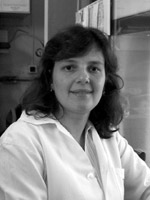Silvia B. Boscardin, Ph.D.

- Title
- Assistant Professor
- Department
- Department of Parasitology
- Institution
- University of Sao Paulo
- Address
-
Av. Prof. Lineu Prestes
1374 - sala 46 - City
- Sao Paulo
- Country
- Brazil
- [email protected]
- Website
- http://www.icb.usp.br/~parasito/silvia-beatriz.html

- Research field
- Immunology
- Award year
- 2003
- Country of origin
- Brazil
- Mentor name
- Michel C. Nussenzweig, Ph.D.
Research
Dendritic cells (DCs) are critical in the process of inducing immunity and peripheral tolerance. This fact opened the possibility that these cells may be targets of possible manipulations aimed at producing immunotherapeutic inducers or suppressors of the immune response. Recently it was shown that antigens can be sent directly to the DCs (Hawiger et al. 2001; Bonifaz et al., 2002). When this happens in the absence of a concomitant inflammatory stimulus, the result is the induction of immune tolerance . On the other hand, when the antigen is sent to these same cells in the presence of an inflammatory stimulus, the result is the induction of a strong immune response. The targeting of antigen to DCs in vivo is accomplished by administering low doses of a recombinant chimeric protein consisting of a monoclonal antibody specific for receptors on the surface of DCs fused with the antigen of interest. Currently we are using monoclonal antibodies that have the ability to bind to the receptor DEC 205 (anti-DEC 205, Inaba et al. 1995; Swiggard et al. 1995; Witmer-Pack et al., 1995) and DCIR2 ( antibody 33D1, Dudziak et al. 2007; Steinman & Witmer, 1984). In studies that we have developed, we demonstrate that these chimeric antibodies are potent immunogens capable of inducing cellular immunity (mediated by CD4 + and CD8 +) and humoral response against the antigen of interest . Thus, the project’s main objective is to use the chimeric antibodies anti-DEC 205 or 33D1 in fusion protein from the parasite Trypanosoma cruzi, Plasmodium yoelii and Plasmodium vivax in immunization protocols. These pathogens were selected because Chagas disease and Malaria are very prevalent in Brazil and efforts have been made to obtain effective immunogens that could be used for prevention or therapeutically.